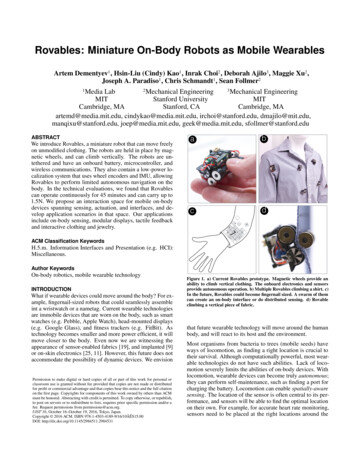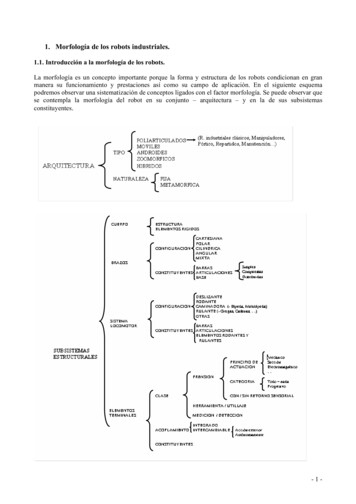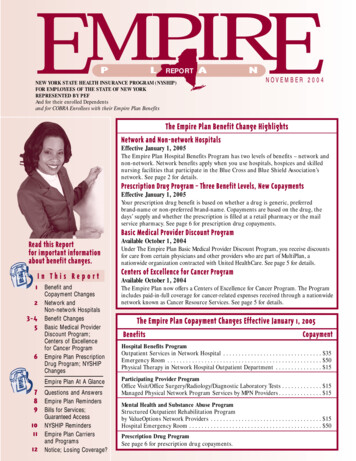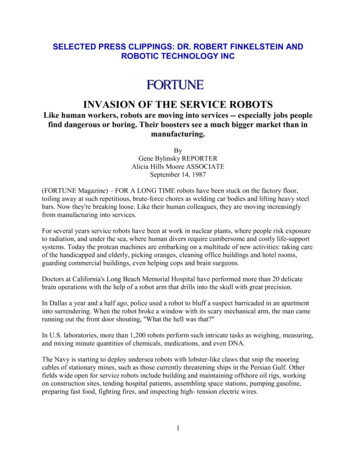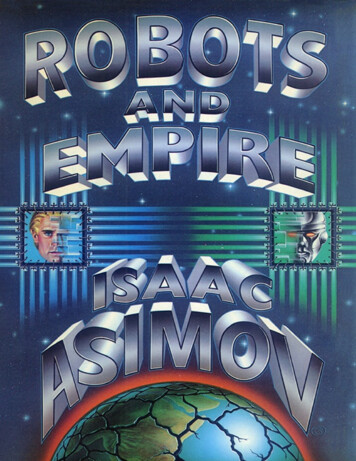
Transcription
ROBOTSANDEMPIREISAACASIMOVIsaac Asimov’s ROBOTSANDEMPIRE heralds a major newlandmark in the great Asimovian galaxy of science fiction. Forit not only presents the thrilling sequel to the best-selling TheRobots of Dawn, but also ingeniously interweaves all three ofAsimov’s classic series: Robot, Foundation, and Empire. This isthe work Asimov fans have been waiting for-an electrifying taleof interstellar intrigue and adventure that sets a new standardin the realm of SF literature.Two hundred years have passed since The Robots of Dawnand Elijah Baley, the beloved hero of the Earthpeople, is dead.The future of the Universe is at a crossroads. Though the forcesof the sinister Spacers are weakened, Dr. Kelden Amadiro hasnever forgotten-or forgiven-his humiliating defeat at the handsof Elijah. Now, with vengeance burning in his heart, he is moredetermined than ever to bring about the total annihilation ofthe planet Earth.But Amadiro has not counted on the equally determinedLady Gladia. Devoted to Elijah Baley, the Auroran beauty has
taken up the legacy of her fallen lover, vowing to stop theSpacers at any cost. With her two robot companions, Daneeland Giskard, she prepares to set into motion a daring anddangerous plan a plan whose success-or failure-will foreverseal the fate of Earth and all who live there.Culminating in a stunning surprise climax, ROBOTSANDEMPIRE is singular science fiction that excites the mind andstimulates the imagination. It is Isaac Asimov at his triumphantbest, proving him, once again, the true Master of the genre.
Fiction by Isaac AsimovROBOTS AND EMPIRE(1985)NIGHTFALL AND OTHER STORIESTHE DISAPPEARING MAN AND OTHER MYSTERIES(1985)(with JanetNORBY AND THE LOST PRINCESSAsimov) (1985)BANQUETS OF THE BLACK WIDOWERSNORBY’S OTHER SECRETNORBY,THE(1984)(with Janet Asimov)(withROBOTJanetAsimov) (1983)THE UNION CLUB MYSTERIES(1983)NINE TOMORROWS(1967)(1966)(1964)(1959)THE DEATH DEALERS (A WHIFF OF DEATH)EARTH IS ROOM ENOUGH(1958)(1958)(1957)LUCKY STARR AND THE MOONS OF JUPITER(1957)(1957)LUCKY STARR AND THE BIG SUN OF MERCURY(1983)(1982)THE COMPLETE ROBOTFANTASTIC VOYAGETHE NAKED SUNTHE WINDS OF CHANGE AND OTHER STORIESFOUNDATION’S EDGETHROUGH A GLASS, CLEARLYLUCKY STARR AND THE RINGS OF SATURN(1983)MIXED-UP(1968)THE REST OF THE ROBOTS(1984)THE ROBOTS OF DAWNASIMOV’S MYSTERIES(1969)(1956)THE END OF ETERNITY(1982)(1955)THE MARTIAN WAY AND OTHER STORIESTHE CASEBOOK OF THE BLACK WIDOWERS(1980)(1955)LUCKY STARR AND THE OCEANS OF VENUS(1954)THE KEY WORD AND OTHER MYSTERIES(1977)THE CAVES OF STEELMORE TALES OF THE BLACK WIDOWERS(1976)LUCKY STARR AND THE PIRATES OF THE 954)(1953)SECOND FOUNDATION(1953)MURDER AT THE ABA(1976)THE CURRENTS OF SPACETHE HEAVENLY HOST(1975)FOUNDATION AND EMPIREBUY JUPITER AND OTHER STORIESTALES OF THE BLACK WIDOWERSHAVE YOU SEEN THESE?(1973)(1972)THE GODS THEMSELVES(1974)(1974)THE BEST OF ISAAC ASIMOVTHE EARLY ASIMOV(1975)(1972)(1952)(1952)DAVID STARR: SPACE RANGERFOUNDATION(1951)THE STARS, LIKE DUSTI, ROBOT(1952)(1951)(1950)PEBBLE IN THE SKY(1950)
All characters in this book are fictionaland any resemblance to actual persons,living or dead, is entirely coincidental.LIBRARY OF CONGRESS CATALOGING IN PUBLICATION DATAAsimov, Isaac, 1920Robots toward empire.I. Title.PS3551.S5R64 1985 813'.54 85-1600ISBN 0-385-19092-1Copyright 1985 by Nightfall, Inc.ALL RIGHTS RESERVEDPRINTED IN THE UNITED STATES OF AMERICAFIRST EDITION
To Robyn and Michaeland to the years of happinessthey will continue to enjoyas they walk the road of life together.
Contents
Part One: Aurora1. The Descendant2. The Ancestor?3. The Crisis4. Another DescendantPart Two: Solaria5. The Abandoned World6. The Crew7. The OverseerPart Three: Baleyworld8. The Settler World9. The Speech10. After the SpeechPart Four: Aurora11. The Old Leader12. The Plan and the Daughter13. The Telepathic Robot14. The DuelPart Five: Earth15. The Holy World16. The City17. The Assassin18. The Zeroth Law19. Alone
Chapter 1The Descendant1.GLADIA FELT the lawn lounge to make sure it wasn’t too damp and then satdown. A touch at the control adjusted it in such a way as to allow her tobe semirecumbent and another activated the diamagnetic field and gaveher, as it always did, the sensation of utter relaxation. And why not? Shewas, in actual fact, floating—a centimeter above the fabric.It was a warm and pleasant night, the kind that found the planetAurora at its best—fragrant and star-lit.With a pang of sadness, she studied the numerous little sparks thatdotted the sky with patterns, sparks that were all the brighter becauseshe had ordered the lights of her establishment dimmed.How was it, she wondered, that she had never learned the names ofthe stars and had never found out which were which in all the twentythree decades of her life. One of them was the star about which her birthplanet of Solaria orbited, the star which, during the first three decades ofher life, she had thought of merely as “the sun.”Gladia had once been called Gladia Solaria. That was when she hadcome to Aurora, twenty decades before—two hundred Standard Galactic
Years—and it was meant as a not very friendly way of marking herforeign birth. A month before had been the bicentennial anniversary ofher she had left unmarked because she did to think of those days. Beforethat, on Solaria, she had been Gladia—Delmarre.She stirred uneasily. She had almost forgotten that surname. Was itbecause it was so long ago? Or was it merely that she labored to forget?All these years she had not regretted Solaria, never missed it.And yet now?Was it because she had now, quite suddenly, discovered herself tohave survived it? It was gone—a historical memory and she still livedon? Did she miss it now for that reason?Her brow furrowed. No, she did not miss it, she decided resolutely.She did not long for it, nor did she wish to return to it. It was just thepeculiar pang of something that had been so much a part of her—however destructively—being gone.Solaria! The last of the Spacer worlds to be settled and made into ahome for humanity. And in consequence, by some mysterious law ofsymmetry perhaps, it was also the first to die?The first? Did that imply a second and third and so on?Gladia felt her sadness deepen. There were those who thought therewas indeed such an implication. If so, Aurora, her long-adopted home,having been the first Spacer world to be settled, would, by that samerule of symmetry, therefore be the last of the fifty to die. In that case, itmight, even at worst, outlast her own stretched-out lifetime and if so,that would have to do.Her eyes sought the stars again. It was hopeless. There was no wayshe could possibly work out which of those indistinguishable dots of
light was Solaria’s sun. She imagined it would be one of the brighterones, but there were hundreds even of those.She lifted her arm and made what she identified to herself only asher “Daneel gesture.” The fact that it was dark did not matter.Robot Daneel Olivaw was at her side almost at once. Anyone whohad known him a little over twenty decades before, when he had firstbeen designed by Han Fastolfe, would not have been conscious of anynoticeable change in him. His broad, high-cheekboned face, with itsshort bronze hair combed back; his blue eyes; his tall, well-knit, andperfectly humanoid body would have seemed as young and as calmlyunemotional as ever.“May I be of help in any way, Madam Gladia?” he asked in an evenvoice.“Yes, Daneel. Which of those stars is Solaria’s sun?”Daneel did not look upward. He said, “None of them, Madam Gladia.At this time of year, Solaria’s sun will not rise until 0320.”“Oh?” Gladia felt dashed. Somehow she had assumed that any star inwhich she happened to be interested would be visible at any time itoccurred to her to look. Of course, they did rise and set at differenttimes. She knew that much. “I’ve been staring at nothing, then.”“The stars, I gather from human reactions,” said Daneel, as though inan attempt to console, “are beautiful whether any particular one of themis visible or not.”“I dare say,” said Gladia discontentedly and adjusted the lounge to anupright position with a snap. She stood up. “However, it was Solaria’ssun I wanted to see—but not so much that I intend to sit here till 0320.”“Even were you to do, so,” said Daneel, “you would need
magnilenses.”“Magnilenses?”“It is not quite visible to the unaided eye, Madam Gladia.”“Worse and worse!” She brushed at her slacks. “I should haveconsulted you first, Daneel.”Anyone who had known Gladia twenty decades before, when she hadfirst arrived in Aurora, would have found a change. Unlike Daneel, shewas merely human. She was still 155 centimeters tall, almost 10centimeters below the ideal height for a Spacer woman. She hadcarefully kept her slim figure and there was no sign of weakness orstiffness about her body. Still, there was a bit of gray in her hair, finewrinkles near her eyes, and a touch of graininess about her skin. Shemight well live another ten or twelve decades, but there was no denyingthat she was already no longer young. That didn’t bother her.She said, “Can you identify all the stars, Daneel?”“I know those visible to the unaided eye, Madam Gladia.”“And when they rise and set on any day of the year?”“Yes, Madam Gladia.”“And all sorts of other things about them?”“Yes, Madam Gladia. Dr. Fastolfe once asked me to gatherastronomical data so that he could have them at his fingertips withouthaving to consult his computer. He used to say it was friendlier to haveme tell him than to have his computer do so.” Then, as though, toanticipate the next question, “He did not explain why that should be so.”Gladia raised her left arm and made the appropriate gesture. Herhouse was at once illuminated. In the soft light that now reached her,she was subliminally aware of the shadowy figures of several robots, but
she paid no attention to that. In any well-ordered establishment, therewere always robots within reach of human beings, both for security andfor service.Gladia took a last fugitive glimpse at the sky, where the stars hadnow dimmed in the scattered light. She shrugged lightly. It had beenquixotic. What good would it have done even if she had been able to seethe sun of that now-lost world, one faint dot among many? She might aswell choose a dot at random, tell herself it was Solaria’s sun, and stare atit.Her attention turned to R. Daneel. He waited for her patiently, theplanes of his face largely in shadow.She found herself thinking again how little he had changed since shehad seen him on arriving at Dr. Fastolfe’s establishment so long ago. Hehad undergone repairs, of course. She knew that, but it was a vagueknowledge that one pushed away and kept at a distance.It was part of the general queasiness that held good for humanbeings, too. Spacers might boast of their iron health and of their lifespans of thirty to forty decades, but they were not entirely immune tothe ravages of age. One of Gladia’s femurs fit into a titanium-silicone hipsocket. Her left thumb was totally artificial, though no one could tellthat without careful ultrasonograms. Even some of her nerves had beenrewired. Such things would be true of any Spacer of similar age from anyof the fifty Spacer worlds (no, forty-nine, for now Solaria could nolonger be counted).To make any reference to such things, however, was an ultimateobscenity. The medical records involved, which had to exist since furthertreatment might be necessary, were never revealed for any reason.
Surgeons, whose incomes were considerably higher than those of theChairman himself, were paid so well, in part, because they werevirtually ostracized from polite society. After all, they knew.It was all part of the Spacer fixation on long life, on theirunwillingness to admit that old age existed, but Gladia didn’t linger onany analysis of causes. She was restlessly uneasy in thinking aboutherself in that connection. If she had a three dimensional map of herselfwith all prosthetic portions, all repairs, marked off in red against thegray of her natural self, what a general pinkness she would appear tohave from a distance. Or so she imagined.Her brain, however, was still intact and whole and while that was so,she was intact and whole, whatever happened to the rest of her body.Which brought her back to Daneel. Though she had known him fortwenty decades, it was only in the last year that he was hers. WhenFastolfe died (his end hastened, perhaps, by despair), he had willedeverything to the city of Eos, which was a common enough state ofaffairs. Two items, however, he had left to Gladia (aside from confirmingher in the ownership of her establishment and its robots and otherchattels, together with the grounds thereto appertaining).One of them had been Daneel.Gladia asked, “Do you remember everything you have evercommitted to memory over the course of twenty decades, Daneel?”Daneel said gravely, “I believe so, Madam Gladia. To be sure, if Iforgot an item, I would not know that, for it would have been forgottenand I would not then recall ever having memorized it.”“That doesn’t follow at all,” said Gladia. “You might well rememberknowing it, but be unable to think of it at the moment. I have frequently
had something at the tip of my tongue, so to speak, and been unable toretrieve it.”Daneel said, “I do not understand, madam. If I knew something,surely it would be there when I needed it.”“Perfect retrieval?” They were walking slowly toward the house.“Merely retrieval, madam. I am designed so.”“For how much longer?”“I do not understand, madam.”“I mean, how much will your brain hold? With a little over twentydecades of accumulated memories, how much longer can it go on?”“I do not know, madam. As yet I feel no difficulty.”“You might not—until you suddenly discover you can remember nomore.”Daneel seemed thoughtful for a moment. “That may be so, madam.”“You know, Daneel, not all your memories are equally important.”“I cannot judge among them, madam.”“Others can. It would be perfectly possible to clean out your brain,Daneel, and then, under supervision, refill it with its important memorycontent only—say, ten percent of the whole. You would then be able tocontinue for centuries longer than you would otherwise. With repeatedtreatment of this sort, you could go on indefinitely. It is an expensiveprocedure, of course, but I would not cavil at that. You’d be worth it.”“Would I be consulted on the matter, madam? Would I be asked toagree to such treatment?”“Of course. I would not order you in a matter like that. It would be abetrayal of Dr. Fastolfe’s trust.”“Thank you, madam. In that case, I must tell you that I would never
submit voluntarily to such a procedure unless I found myself to haveactually lost my memory function.”They had reached the door and Gladia paused. She said, in honestpuzzlement, “Why ever not, Daneel?”Daneel said in a low voice, “There are memories I cannot risk losing,madam, either through inadvertence or through poor judgment on thepart of those conducting the procedure.”“Like the rising and setting of the stars?—Forgive me, Daneel, I didn’tmean to be joking. To what memories are you referring?”Daneel said, his voice still lower, “Madam, I refer to my memories ofmy onetime partner, the Earthman Elijah Baley.”And Gladia stood there, stricken, so that it was Daneel who had totake the initiative, finally, and signal for the door to open.2.ROBOT GISKARD REVENTLOV was waiting in the living room and Gladiagreeted him with that same pang of uneasiness that always assailed herwhen she faced him.He was primitive in comparison with Daneel. He was obviously arobot—metallic, with a face that had nothing human in expression uponit, with eyes, that glowed a dim red, as could be seen if it were darkenough. Whereas Daneel wore clothing, Giskard had only the illusion ofclothing—but a skillful illusion, for it was Gladia herself who haddesigned it.“Well, Giskard,” she said.“Good evening, Madam Gladia,” said Giskard with a small bow of his
head.Gladia remembered the words of Elijah Baley long ago, like awhisper inside the recesses of her brain:“Daneel will take care of you. He will be your friend as well asprotector and you must be a friend to him—for my sake. But it isGiskard I want you to listen to. Let him be your adviser.”Gladia had frowned. “Why him? I’m not sure I like him.”“I do not ask you to like him. I ask you to trust him.”And he would not say why.Gladia tried to trust the robot Giskard, but was glad she did not haveto try to like him. Something about him made her shiver.She had both Daneel and Giskard as effective parts of herestablishment for many decades during which Fastolfe had held titularownership. It was only on his deathbed that Han Fastolfe had actuallytransferred ownership. Giskard was the second item, after Daneel, thatFastolfe had left Gladia.She had said to the old man, “Daneel is enough, Han. Your daughterVasilia would like to have Giskard. I’m sure of that.”Fastolfe was lying in bed quietly, eyes closed, looking more peacefulthan she had seen him look in years. He did not answer immediately andfor a moment she thought he had slipped out of life so quietly that shehad not noticed. She tightened her grip on his hand convulsively and hiseyes opened.He whispered, “I care nothing for my biological daughters, Gladia.For twenty centuries, I have had but one functional daughter and thathas been you. I want you to have Giskard. He is valuable.”“Why is he valuable?”
“I cannot say, but I have always found his presence consoling. Keephim always, Gladia. Promise me that.”“I promise,” she said.And then his eyes opened one last time and his voice, finding a finalreservoir of strength, said, in almost a natural tone of voice, “I love you,Gladia, my daughter.”And Gladia said, “I love you, Han, my father.”Those were the last words he said and heard. Gladia found herselfholding the hand of a dead man and, for a while, could not bring herselfto let go.So Giskard was hers. And yet he made her uneasy and she didn’tknow why.“Well, Giskard,” she said, “I’ve been trying to see Solaria in the skyamong the stars, but Daneel tells me it won’t be visible till 0320 and thatI would require magnilenses even then. Would you have known that?”“No, madam.”“Should I wait up till all hours? What do you think?”“I suggest, Madam Gladia, that you would be better off in bed.”Gladia bridled, “Indeed? And if I choose to stay up?”“Mine is only a suggestion, madam, but you will have a hard daytomorrow and you will undoubtedly regret missing your sleep if you stayup.”Gladia frowned. “What’s going to make my day hard tomorrow,Giskard? I’m not aware of any forthcoming difficulty.”Giskard said, “You have an appointment, madam, with one LevularMandamus.”“I have? When did that happen?”
“An hour ago. He photophoned and I took the liberty—”“You took the liberty? Who is he?”“He is a member of the Robotics Institute, madam.”“He’s an underling of Kelden Amadiro, then.”“Yes, madam.”“Understand, Giskard, that I am not in the least interested in seeingthis Mandamus or anyone with any connection with that poisonous toadAmadiro. So if you’ve taken the liberty of making an appointment withhim in my name, take the further liberty right now of phoning him againand canceling.”“If you will confirm it as an order, madam, and make that order asstrong and as definite as you can, I will try to obey. I may not be able to.In my judgment, you see, you will be doing yourself harm if you cancelthe appointment and I must not allow you to come to harm through anyaction of mine.”“Your judgment might just possibly be wrong, Giskard. Who is thisman that my failure to see him will do me harm? His being a member ofthe Robotics Institute scarcely makes him important to me.”Gladia was perfectly aware of the fact that she was venting spleen atGiskard without much justification. She had been upset by the news ofSolaria’s abandonment and embarrassed by the ignorance that led her tolook for Solaria in a sky that did not contain it.Of course, it had been Daneel whose knowledge had made her ownlack so obvious and yet she had not railed at him—but, then, Daneellooked human and so Gladia automatically treated him as though hewere. Appearance was everything. Giskard looked like a robot, so onecould easily assume he had no feelings to hurt.
And, to be sure, Giskard did not react at all to Gladia’s peevishness.(Neither would Daneel have reacted—if it came to that.) He said, “I havedescribed Dr. Mandamus as a member of the Robotics Institute, but he isperhaps more than that. In the last few years, he has been right-handman to Dr. Amadiro. This makes him important and he is not likely to beignored. Dr. Mandamus would not be a good man to offend, madam.”“Would he not, Giskard? I care nothing for Mandamus and a greatdeal less than nothing for Amadiro. I presume you remember thatAmadiro once, when he and I and the world were young, did his best toprove that Dr. Fastolfe was a murderer and that it was only by a nearmiracle that his machinations were aborted.”“I remember it very well, madam.”“That’s a relief. I was afraid that in twenty decades you hadforgotten. In those twenty decades, I have had nothing to do withAmadiro or with anyone connected with him and I intend to continuethat policy. I don’t care what harm I may do myself or what theconsequences might be. I will not see this Dr. whoever-he-is and, in thefuture, do not make appointments in my name without consulting me or,at the very least, without explaining that such appointments are subjectto my approval.”“Yes, madam,” said Giskard, “but may I point out—”“No, you may not,” Gladia said and turned away from him.There was silence while she moved away three steps and thenGiskard’s calm voice said, “Madam, I must ask you to trust me.”Gladia stopped. Why did he use that expression?She heard again that long-ago voice, “I do not ask you to like him. Iask you to trust him.”
Her lips tightened and she, frowned. Reluctantly, not wanting to, sheturned back.“Well,” she said ungraciously, “what is it you want to say, Giskard?”“Just that as long as Dr. Fastolfe was alive, madam, his policiespredominated on Aurora and throughout the Spacer worlds. As a result,the people of Earth have been allowed to migrate freely to varioussuitable planets in the Galaxy and what we now call the Settler worldshave flourished. Dr. Fastolfe is dead now, however, and his successorslack his prestige. Dr. Amadiro has kept his own anti-Earth views aliveand it is very possible that they may now triumph and that a vigorouspolicy against Earth and the Settler worlds may be undertaken.”“If so, Giskard, what can I do about it?”“You can see Dr. Mandamus and you can find out what it is thatmakes him so anxious to see you, madam. I assure you that he was mostinsistent on making the appointment as early as possible. He asked to seeyou at 0800.”“Giskard, I never see anyone before noon.”“I explained that, madam. I took his anxiety to see you at breakfast,despite my explanation, to be a measure of his desperation. I felt itimportant to find out why he should be so desperate.”“And if I don’t see him, then it is your opinion, is it, that it will harmme personally? I don’t ask whether it will harm Earth, or the Settlers, orthis, or that. Will it harm me?”“Madam, it may harm the ability of Earth and the Settlers to continuethe settlement of the Galaxy. That dream originated in the mind ofPlainclothesman Elijah Baley more than twenty decades ago. The harmto Earth will thus become a desecration of his memory. Am I wrong in
thinking that any harm that comes to his memory would be felt by youas though it were harm to yourself personally?”Gladia was staggered. Twice within the hour now, Elijah Baley hadcome into the conversation. He was long gone now—a short-livedEarthman who had died over sixteen decades before—yet the meremention of his name could still shake her.She said, “How can things suddenly be that serious?”“It is not sudden, madam. For twenty decades, the people of Earthand the people of the Spacer worlds have been following parallel coursesand have been kept from converging into conflict by the wise policies ofDr. Fastolfe. There has, however, always been a strong oppositionmovement that Dr. Fastolfe has had to withstand at all times. Now thatDr. Fastolfe is dead, the opposition is much more powerful. Theabandonment of Solaria has greatly increased the power of what hadbeen the opposition and may soon be the dominant political force.”“Why?”“It is a clear indication, madam, that Spacer strength is declining andmany Aurorans must feel that strong action must be taken—now ornever.”“And you think that my seeing this man is important in preventingall this?”“That is so, madam?”Gladia was silent for a moment and remembered again, thoughrebelliously, that she had once promised Elijah that she would trustGiskard. She said, “Well, I don’t want to and I don’t think my seeing thisman will do anyone any good—but, very well, I will see him.”3.
GLADIA WAS ASLEEP and the house was dark—by human standards. It wasalive, however, with motion and action, for there was much for therobots to do—and they could do it by infrared.The establishment had to be put into order after the inevitabledisordering effects of a day’s activity. Supplies had to be brought in,rubbish had to be disposed of, objects had to be cleaned or polished orstored, appliances had to be checked, and, always, there was guard duty.There were no locks on any doors; there did not have to be. Therewas no violent crime of any sort on Aurora, either against human beingsor against property. There could not be anything of the sort, since everyestablishment and every human being were, at all times, guarded byrobots. This was well known and taken for granted.The price for such calm was that the robot guards had to remain inplace. They were never used—but only because they were always there.Giskard and Daneel, whose abilities were both more intense andmore general than those of the other establishment robots, did not havespecific duties, unless one counted as a specific duty that of beingresponsible for the proper performance of all the other robots.At 0300, they had completed their rounds out on the lawn and in thewooded area to make sure that all the outer guards were performingtheir functions well and that no problems were arising.They met near the southern limit of the establishment grounds andfor a while they spoke in an abbreviated and Aesopic language. Theyunderstood each other well, with many decades of communicationbehind them, and it was not necessary for them to involve themselves inall the elaboration’s of human speech.Daneel said in an all but unhearable whisper, “Clouds. Unseen.”
Had Daneel been speaking for human ears, he would have said, “Asyou see, friend Giskard, the sky has clouded up. Had Madam Gladiawaited her chance to see Solaria, she would not, in any case, havesucceeded.”And Giskard’s reply of “Predicted. Interview, rather,” was theequivalent of “So much was predicted in the weather forecast, friendDaneel, and might have been used as an excuse to get Madam Gladia tobed early. It seemed to me to be more important, however, to meet theproblem squarely and to persuade her to permit this interview I havealready told you about.”“It seems to me, friend Giskard,” said Daneel, “that the chief reasonyou may have found persuasion difficult is that she has been upset bythe abandonment of Solaria. I was there once with Partner Elijah whenMadam Gladia was still a Solarian and was living there.”“It has always been my understanding,” said Giskard, “that MadamGladia had not been happy on her home planet; that she left her worldgladly and had, at no time, any intention of returning. Yet I agree withyou that she seems to have been unsettled by the fact of Solaria’s historyhaving come to an end.”“I do not understand this reaction of Madam Gladia,” said Daneel,“but there are many times that human reactions do not seem to followlogically from events.”“It is what makes it difficult to decide, sometimes, what will do ahuman being harm and what will not.” Giskard might have said it with asigh, even a petulant sigh, had he been human. As it was, he stated itmerely as an unemotional assessment of a difficult situation. “It is one ofthe reasons, why it seems to me that the Three Laws of Robotics are
incomplete or insufficient.”“You have said this before, friend Giskard, and I have tried to believeso and failed,” said Daneel.Giskard said nothing for a while, then, “Intellectually, I think theymust be incomplete or insufficient, but when I try to believe that, I toofail, for I am bound by them. Yet if I were not bound by them, I am sureI would believe in their insufficiency.”“That is a paradox that I cannot understand.”“Nor can I. And yet I find myself forced to express this paradox. Onoccasion, I feel that I am on the verge of discovering what theincompleteness or insufficiency of the Three Laws might be, as in myconversation with Madam Gladia this evening. She asked me how failureto keep the appointment might harm her personally, rather than simplycause harm in the abstract, and there was an answer I could not givebecause it was not within the compass of the Three Laws.”“You gave a perfect answer, friend Giskard. The harm done toPartner Elijah’s memory would have affected Madam Gladia deeply.”“It was the best answer within the compass of the Three Laws. It wasnot the best answer possible.”“What was the best answer possible?”“I do not know, since I cannot put it into words or even concepts aslong as I am bound by the Laws.”“There is nothing beyond the Laws,” said Daneel.“If I were human,” said Giskard, “I could see beyond the Laws and Ithink, friend Daneel, that you might be able to see beyond them soonerthan I would.”“
Asimov's classic series: Robot, Foundation, and Empire. This is the work Asimov fans have been waiting for-an electrifying tale of interstellar intrigue and adventure that sets a new standard in the realm of SF literature. Two hundred years have passed since The Robots of Dawn and Elijah Baley, the beloved hero of the Earthpeople, is dead.

